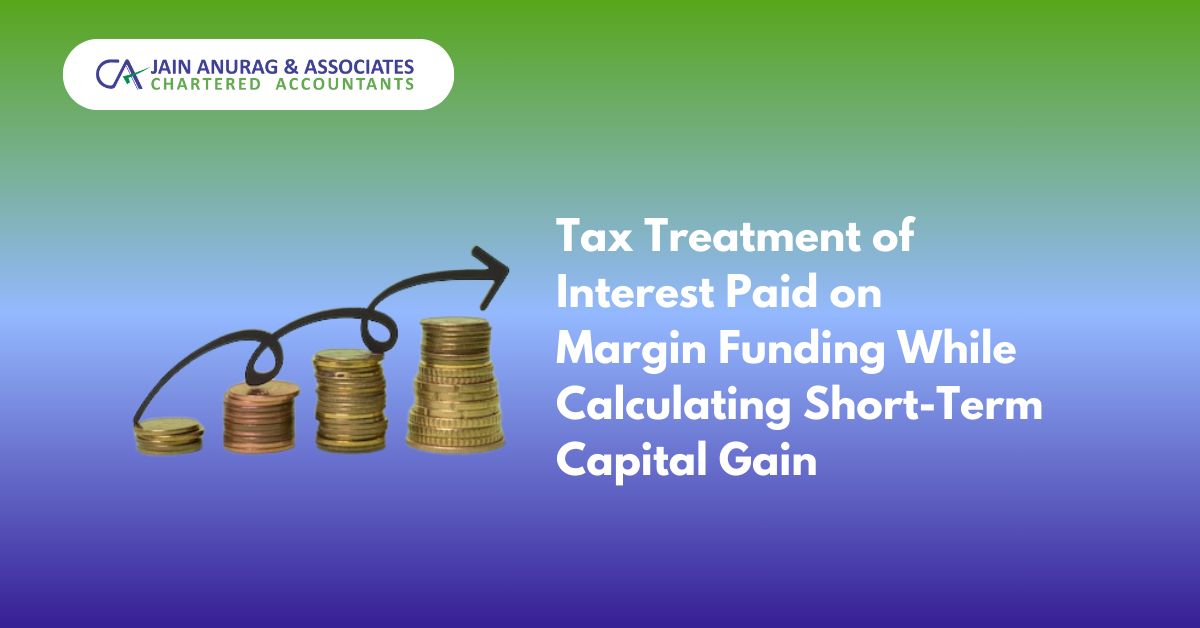Jan 02, 2025, Posted by Admin
Tax Treatment of Interest Paid on Margin Funding While Calculating Short-Term Capital Gain

When it comes to investing in shares, many investors use for margin funding as a way to increase their purchasing power. Margin funding allows an investor to borrow money from a broker to purchase shares and securities, with the securities themselves serving as collateral for the loan. While this can be a beneficial strategy for increasing the potential return on investment, it also introduces an important tax consideration: the treatment of interest paid on the margin loan when calculating short-term capital gains (STCG).
Understanding the income tax implications of interest paid on margin funding is important for investors to ensure compliance with the Income Tax Act to avoid unnecessary tax liabilities.
In this blog, we will explore the tax treatment of interest paid on margin funding and to understand whether it can be deducted while calculating STCG?
The Basics of Short-Term Capital Gains (STCG)
Under the Income Tax Act of India, when an investor sells shares within 12 months of purchasing them, the resulting profit is classified as short-term capital gain (STCG). and the gains are taxed at a rate of 20% from FY 2024-25 (subject to certain exemptions).
When calculating STCG, the tax liability is calculated on the net gain from the sale of shares. The net gain is determined by deducting the cost of acquisition and transfer expenses from the sale proceeds. The cost of acquisition includes the purchase price of the shares, and transfer expenses refer to any costs associated with the sale, such as brokerage on security transaction
Margin Funding and Its Impact on Share Acquisition
Margin funding allows an investor to buy more shares than they could otherwise afford by borrowing funds from a broker. The loan, along with any interest charged on the margin loan, is typically repaid over time, with the interest cost forming an essential part of the borrowing arrangement.
However, when it comes to tax calculations on STCG, the interest paid on margin funding is often subject to scrutiny. The question arises: Can the interest paid on margin loan be deducted from the STCG to reduce the taxable income?
Tax Treatment of Interest Paid on Margin Funding
As per the provisions of the Income Tax Act 1961, deductions related to short-term capital gains are strictly limited to the cost of acquisition of the shares and transfer expenses incurred during the sale of the shares. The tax laws do not allow deductions for any other expenses or charges that are not directly related to the acquisition or transfer of the asset.
Here In the case of margin funding, the interest paid on the borrowed funds is considered an expenditure related to the purchase of shares. However, the Income Tax Act does not provide for the deduction of such interest expenses against short-term capital gains. The reason for this is that the interest expense is not directly linked to the sale of shares but to the borrowing arrangement itself for buying share.
Judicial Precedents and Interpretations
There have been several judicial precedents have ruled on the issue of whether interest paid on loans for the purchase of shares can be deducted while calculating capital gains and In these rulings, it has consistently been held that interest expenses related to borrowing funds for purchasing shares are not deductible when calculating capital gains, whether short-term or long-term.
The reasoning behind this is that the Income Tax Act explicitly allows deductions for the cost of acquisition and transfer expenses, but there is no provision that allows for the deduction of interest paid on loans for purchasing shares. This is particularly important when the interest payment is considered part of the financial cost of acquiring an asset rather than a direct cost of the asset itself.
Conclusion
In summary, while margin funding can be an effective way for investors to increase their purchasing power in the stock market, the interest paid on the margin loan does not qualify for deduction against short-term capital gains under the Income Tax Act. The tax treatment of such interest payments is clear: they cannot be deducted from the sale proceeds when calculating STCG.
Investors should, therefore, be careful when taking margin loans for the purpose of investing in shares and should factor in the potential tax impact of interest payments on their overall investment strategy.
We, at Jain Anurag & Associates, Chartered Accountants, offer expert taxation consultancy to help ensure effective tax planning and full compliance with the provisions of the Income Tax Act.